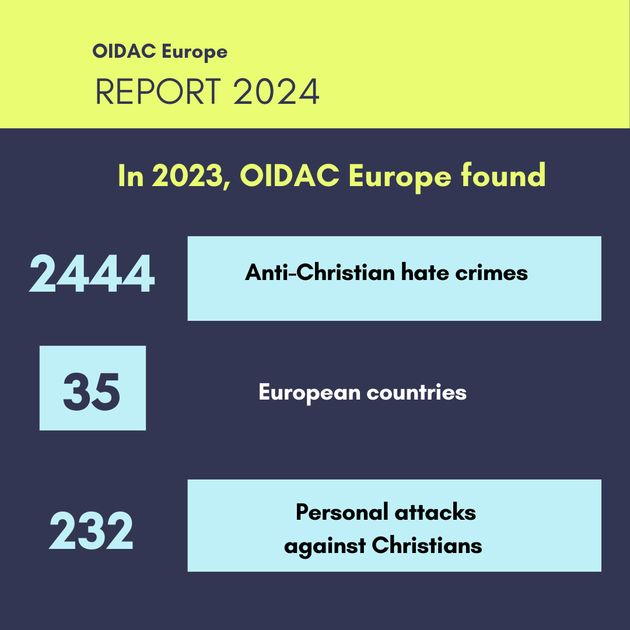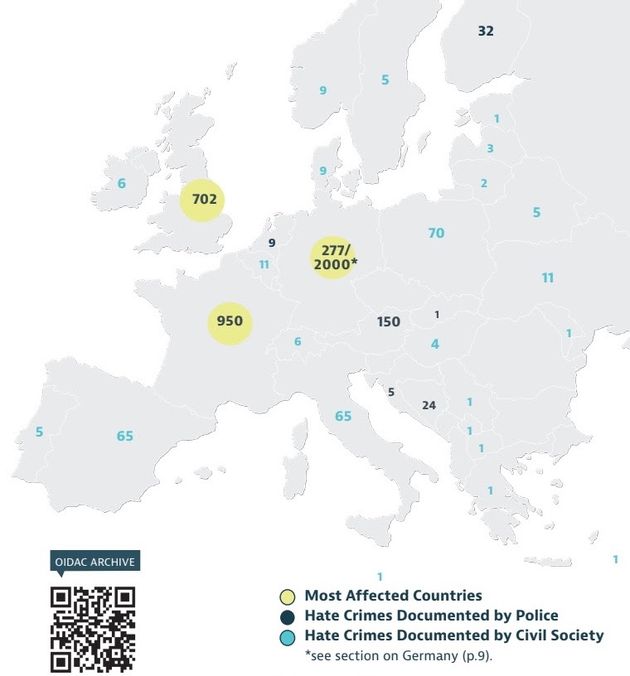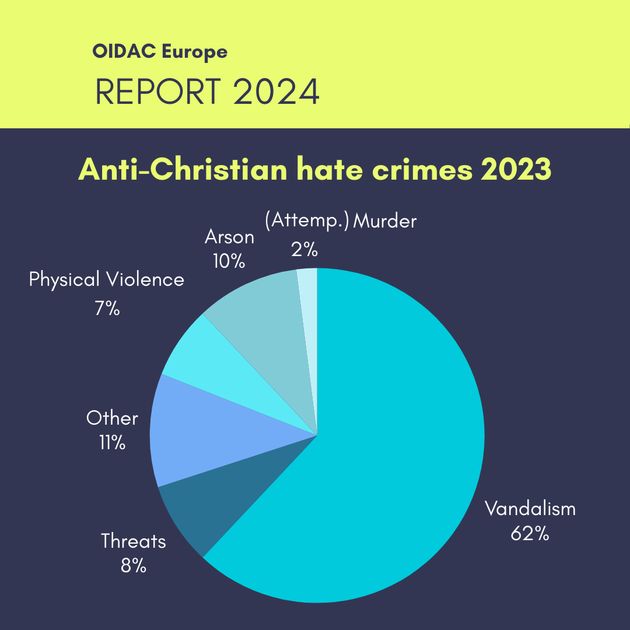Discrimination against Christians on rise in Europe
The Observatory on Intolerance and Discrimination against Christians in Europe reports at least 2,444 anti-Christian hate crimes in 35 European countries in 2023.
OIDAC · VIENNA · 19 NOVEMBER 2024 · 18:45 CET

The Observatory on Intolerance and Discrimination against Christians in Europe (OIDAC Europe) recently launched its Intolerance and Discrimination Against Christians in Europe 2024 Report.
OIDAC Europe’s Annual Report provides data on anti-Christian hate crimes; discrimination against Christians and restrictions of religious freedom and related fundamental freedoms of Christians in Europe.
According to the report, there were 2,444 anti-Christian hate crimes documented by police and civil society in 35 European countries in 2023, including 232 personal attacks on Christians, but “assume a high number of unreported cases”, said Anja Hoffmann, executive director of OIDAC Europe.

France, United Kingdom and Germany, the most affected
Furthermore, the most affected countries in 2023 are France, with almost 1,000 anti-Christian attacks in 2023, 90% of which were against churches and cemeteries; the United Kingdom, with the number of anti-Christian hate crimes increased 15% from the previous year; and Germany, where “hate crimes have seen a worrying increase of 105% between 2022 and 2023, rising to 277”.

Regarding the incidents recorded, the most common forms of violence were vandalism against churches (62%), including many cases of desecration (24%) and beheading of religious statues, followed by arson attacks (10%) and threats (8%).

“While physical violence remains relatively rare (7%), there have been some tragic cases in 2023, including 1 case of murder, 7 cases of attempted murder and a total of 68 attacks on persons with an anti-Christian bias”, states the report.
Discrimination against Christians
In addition to violent attacks, OIDAC Europe has also documented an increasing discrimination against Christians because of their faith and the expression of their religious beliefs.
Most of the cases collected in 2023-24 are found at the workplace and and in public life, as well as pressure on Christian politicians to denounce their beliefs or resign from office.
“Christians who adhere to traditional religious beliefs face increasing discrimination and hostility, ranging from bullying at work to the loss of employment. It is very worrying that the peaceful expression of personal religious beliefs has become the potential end of a political career or employment, or even the beginning of a court case”, underlined Hoffmannn.
The report highlighted the situation in UK, where a study showed that 56% of respondents said they had experienced hostility and ridicule at work because of their religious beliefs, rising to 61% among those under 35. it also revealed that 18% had experienced discrimination.
For OIDAC Europe, “Christian politicians in Europe increasingly report feeling hostility and pressure. In many Western European countries, holding certain core values in line with one’s religious beliefs is an obstacle to equal opportunities in political competition”.
Among others, they put the example of Scottish politician Kate Forbes and her colleague Tim Farron.
They also recall that in Finland, member of parliament Päivi Räsänen and Lutheran Bishop Juhana Pohjola have been on trial since 2019, when Räsänen was accused of “hate speech”. After being cleared of all charges by the Helsinki Court of Appeal, the case has now been taken to Finland’s Supreme Court.
Restrictions of religious freedom
The report warns that “in recent years, Christians in Europe have faced increasing restrictions on their religious freedom or even criminal prosecution for the peaceful expression of their religious beliefs”.
OIDAC Europe mentioned the cases of Adam Smith-Connor and Isabel Vaughan-Spruce, who were accused of praying silently in a public area in a so-called ‘buffer zone’ surrounding an abortion clinic. Vaughan-Spruce received a payout from the police for wrongful arrest, but Smith-Connor was found guilty.
Another example of restrictions on religious manifestations in the report are the ban of performing baptisms in the canton of Geneva, and the removal by the French Council of State of a religious statue in front of a church in Sables-d’Olonne, among other cases.
“These trends should alert us all to step up efforts to protect freedom of religion including the freedom to openly and respectfully discuss different philosophical and religious viewpoints on sensitive issues, without fear of reprisal and censorship”, said Hoffmann.
She also stressed the necessity of coordinated efforts, and the creation of the position of an EU Coordinator combating anti-Christian hatred, similar to the existing mandates on combating antisemitism anti-Muslim hatred.
A call to action
OIDAC Europe hopes “to contribute to the safeguarding of religious freedom of Christians and all believers across Europe, by raising awareness and providing data as well as a thorough human rights analysis about these developments”.
“As freedom of thought, conscience, and religion is a cornerstone for free and democratic societies, we hope that states will not compromise on the protection of these fundamental rights, and thus ensure an open and peaceful climate in our societies”, they conclude.
You can read the full repost here
One more year
Learn all about our #OneMoreYearEF campaign here (English).
Published in: Evangelical Focus - europe - Discrimination against Christians on rise in Europe
